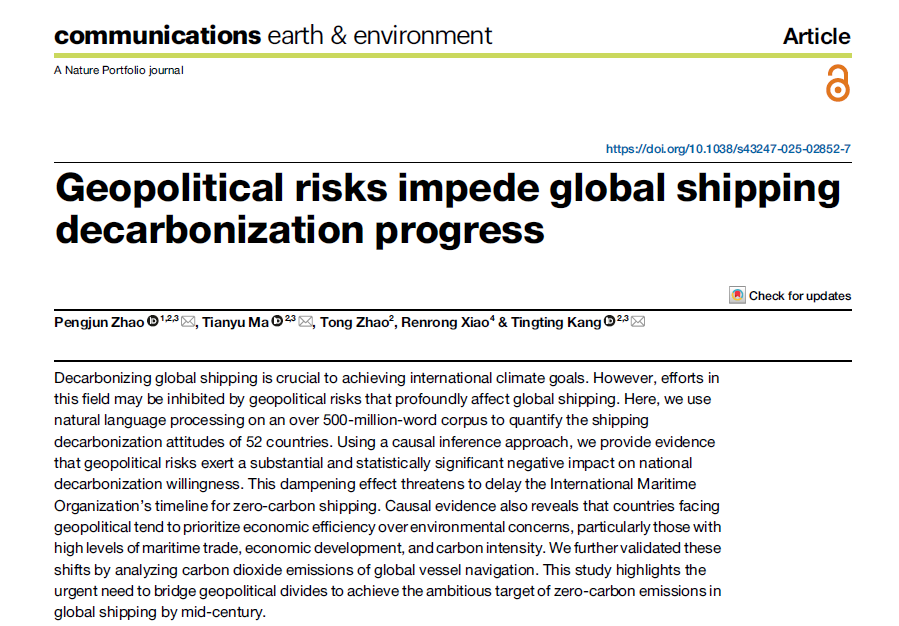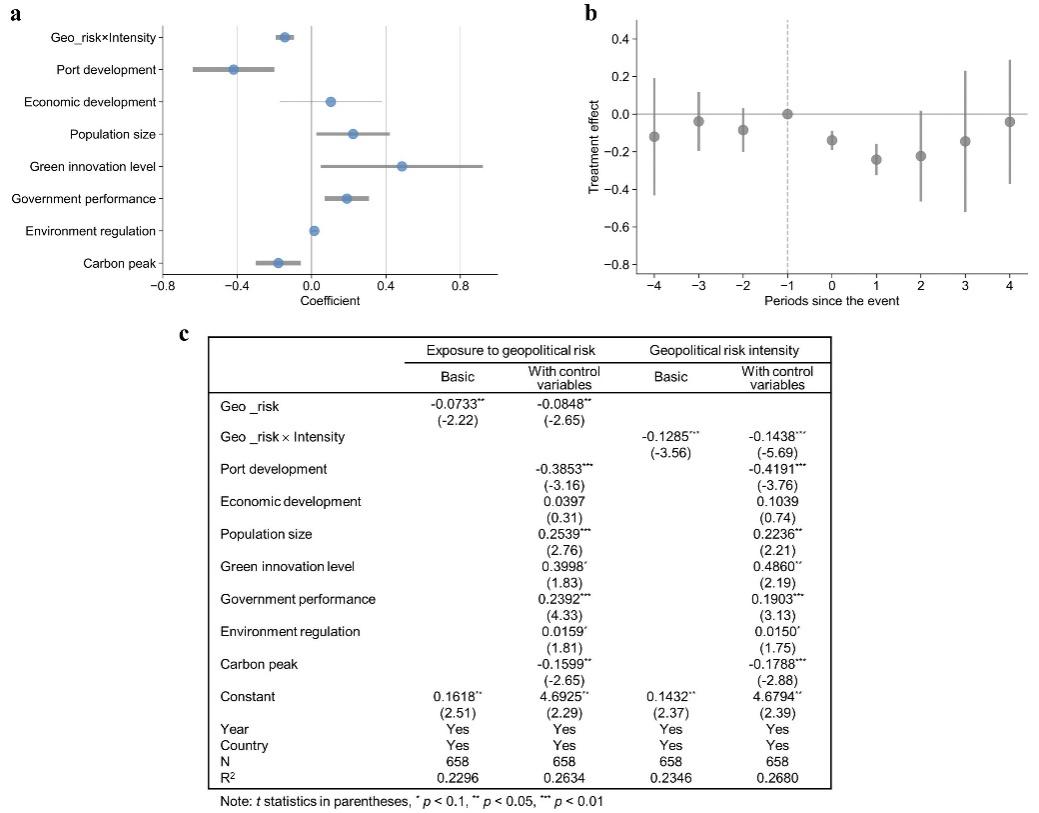
Maritime shipping carries about 80% of global trade, serving as the lifeblood of the world economy and a critical front in global climate action. In 2023, the shipping sector emitted approximately 911 million tonnes of CO₂ equivalent, highlighting its central role in global decarbonization efforts. Recently, the issue of a “shipping carbon tax” sparked heated debate among governments at the International Maritime Organization (IMO) meeting in London. Understanding the mechanisms that shape maritime carbon emissions is essential for developing sound and equitable carbon pricing policies.
A research team led by Professor Pengjun Zhao from Peking University, supported by the National Science Fund for Distinguished Young Scholars and related projects, employed natural language processing (NLP) to quantify the attitudes of 52 countries toward shipping decarbonization from 2010 to 2024. Using causal inference methods, the study revealed that geopolitical risks have a significant negative impact on national willingness to decarbonize shipping, potentially delaying the IMO’s net-zero shipping target by up to 50 years.
The research further found that when confronted with geopolitical tensions, countries tend to prioritize economic interests over environmental goals, particularly those with large maritime trade volumes, rapid economic growth, and high carbon intensity. The findings, published in Nature’s journal Communications Earth & Environment under the title “Geopolitical risks impede global shipping decarbonization progress”, shed new light on how political instability can slow the pace of the global energy transition.
Revealing the Hidden Geopolitical Mechanism Behind Shipping Emissions
This study uncovers a long-overlooked geopolitical dimension in maritime carbon research, demonstrating how conflicts and international tensions can indirectly increase global shipping emissions. By quantifying this mechanism, the study provides critical scientific evidence for designing fair and effective global decarbonization strategies. It also advances transport geography theory and establishes a new big-data-driven human geography research paradigm.
Decarbonization Attitudes and Geopolitical Risks
Using large language models (LLMs) enhanced by transfer learning, the research extracted sentiment and quantified national and industry-level decarbonization attitudes. Figure 1(a) shows that global shipping’s decarbonization sentiment diverged sharply after 2019, with the Russia–Ukraine conflict in 2022 marking a major turning point. Afterward, sentiment scores dropped significantly and persistently. Events such as the Nord Stream pipeline explosion and the Israel–Palestine conflict further deepened this decline. Figure 1(b) illustrates the spatiotemporal evolution of geopolitical risk and decarbonization sentiment across 52 countries. Overall geopolitical risk has been rising, with the Global North experiencing a much steeper increase than the Global South. Since 2020, national decarbonization attitudes have notably weakened, especially in European and Middle Eastern countries, while Southeast Asian nations (e.g., Thailand, Singapore, Indonesia) showed relatively stable attitudes. These patterns suggest a strong correlation between geopolitical events and declining decarbonization commitment.

Figure 1: Evolution of global and national decarbonization attitudes and geopolitical risk indices.
Causal Analysis: Quantifying the Impact of Geopolitical Risk
To identify the causal relationship between geopolitical risks and national decarbonization attitudes, the team applied a difference-in-differences (DID) model. The results confirm that each one-unit increase in geopolitical risk lowers a country’s decarbonization willingness by 14.38%.
Figure 2 presents the empirical regression and parallel trend test results. Further stagewise regression analysis revealed that the negative impact intensifies over time. Although the IMO’s strengthened climate policies since 2018 partially mitigate this effect, their influence remains limited.
The study also found heterogeneity across countries: those with higher economic development, greater trade openness, and higher carbon intensity are more likely to retract their decarbonization ambitions under geopolitical pressure.

Figure 2: Difference-in-differences analysis—baseline regression and parallel trend verification.
Empirical Verification Using AIS Shipping Data
To validate these findings, the team analyzed AIS-based vessel emission data and found that geopolitical conflicts directly increase maritime CO₂ emissions by altering global shipping routes.
Figure 3 shows that during the Russia–Ukraine conflict, shipping-related emissions in affected waters rose by 1.5%, and in major maritime chokepoints by up to 15.3%. The Israel–Palestine conflict led to a 61.3% increase in emissions from vessels rerouting around the Cape of Good Hope.
These spatial emission patterns confirm a growing North–South divide in global decarbonization responses, providing a complete evidence chain linking geopolitical risk to carbon outcomes in the shipping sector.

Figure 3: Spatial distribution of maritime CO₂ emissions following geopolitical events (Russia–Ukraine conflict, Nord Stream explosion, Israel–Palestine conflict).
Implications for Global Green Maritime Governance
This study offers new insights for understanding global green shipping governance. It suggests that the IMO should further strengthen international coordination, integrate geopolitical risk assessment into its climate policy framework, and rethink the structure of global shipping carbon taxation to ensure equity and resilience amid rising geopolitical uncertainty.
Professor Pengjun Zhao is the first and corresponding author of the paper. Associate Researchers Tianyu Ma and Tingting Kang are co-corresponding authors. The research was supported by the National Natural Science Foundation of China (Grants 42525101, 42130402).
Read the full paper:
https://doi.org/10.1038/s43247-025-02852-7